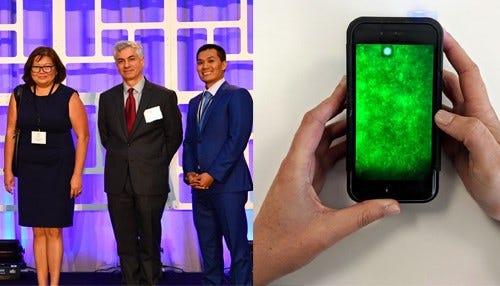Venture Winners Take Aim at Diabetes, Disease Outbreaks
 Chang (far left) and the SalvePeds team accept the top prize at the Indiana Life Sciences Summit. OmniVis (right) was named runner-up.
Chang (far left) and the SalvePeds team accept the top prize at the Indiana Life Sciences Summit. OmniVis (right) was named runner-up.
Subscriber Benefit
As a subscriber you can listen to articles at work, in the car, or while you work out. Subscribe NowPatients who have undergone a diabetes-related amputation currently face a terrifying prognosis: only 50 percent survive one year after the procedure. Notre Dame startup SalvePeds believes it has uncovered a drug that will save the limbs and lives of people with diabetes. Purdue University startup OmniVis also aims to save lives by battling disease outbreaks in low-resource areas. The company has created a disposable test kit for smartphones to detect pathogens. Both innovations are one step closer to commercialization after capturing the top prizes at the recent New Venture Competition during the Indiana Life Sciences Summit.
The seventh annual competition, led by Indiana life sciences initiative BioCrossroads, has awarded more than $350,000 to 23 startups, leading to about $35 million in follow-up funding.
SalvePeds, which means “saving feet” in Latin, captured the top prize of $25,000. Diabetic foot ulcers are a common problem for people with the disease—one in four patients will develop the wounds. And diabetic foot ulcers can have tragic outcomes; they are notoriously difficult to heal and often result in lower-limb amputations—about 100,000 per year in the U.S.
“This is a big unmet medical need. Just in the U.S., one million patients have diabetic foot ulcers,” says SalvePeds Interim Chief Executive Officer Dr. Mayland Chang. “The problem is, once the lower extremity is amputated, it becomes an even bigger wound, and at least 50 percent [of these patients die].”
Chang says a detrimental enzyme prevents diabetic foot ulcers from healing properly, and current treatments don’t address the cause. SalvePeds has created a small molecule inhibitor in the form of a topical gel that counteracts the enzyme, allowing the wound to heal, thus blocking the domino effect that leads to amputations. The startup is working with Notre Dame’s IDEA Center and believes it could submit the drug to the FDA in less than two years.
“We’re very excited about bringing something to market that will really help patients and could save their lives,” says Chang, who has personal connections to diabetes. Her mother passed away from complications of the disease, her aunt died prematurely from diabetes, her sister is diabetic and Chang is pre-diabetic.
OmniVis captured second place and the $15,000 prize for its technology that puts “the power of the lab in the palm of your hand.” The startup has created a hardware platform and disposable test kits that attach to a smartphone; in layman’s terms, the technology converts a smartphone into a specialized microscope.
“If you think about disease outbreaks like Ebola that happen around the globe, there’s no fast way to diagnose for these diseases,” says OmniVis co-founder and Chief Executive Officer Dr. Katherine Clayton. “It’s really discouraging for these communities that are undergoing these disease outbreaks, and aid workers are also exhausted.”
The startup is initially focusing on the detection of the cholera pathogen. In the field, a medical professional places a water sample on the disposable test kit. Hardware that slips over a smartphone contains specialized lenses to analyze the sample; when the user opens the OmniVis app, an algorithm analyzes the images to detect if the cholera pathogen is present or not. Conventional methods require three to five days to detect cholera in water, but OmniVis says it can deliver results in 30 minutes.
Because the technology uses a smartphone, Clayton says the information can also be geotagged, showing where hot spots are occurring. That data can aid health organizations, local clinics or governments to make more informed decisions about how to treat infected areas.
“We love that there’s this up and coming entrepreneurial startup community [in Indiana],” says Clayton, who earned a PhD in mechanical engineering from Purdue. “Being part of this community is great, because we get to be surrounded by like-minded people who are excited for the progression of startups in Indiana, particularly in science and tech.”
OmniVis is planning a pilot study in Haiti with the Emerging Pathogens Institute. While its initial focus is cholera detection in water samples, the startup will expand into blood pathogen testing.
Novosteo, a West Lafayette-based company developing a drug to speed the healing of bone fractures, won the third place $10,000 prize. Buoyed by the prize money and exposure during the event, BioCrossroads is hopeful the handful of promising startups will mature into successful companies that will fuel the next generation of growth in Indiana’s life sciences industry.
Clayton explains how OmniVis’ technology uses a smartphone’s video capability to analyze samples.
Chang says the startup’s drug takes aim at the enzyme that prevents wounds from healing in people with diabetes.
